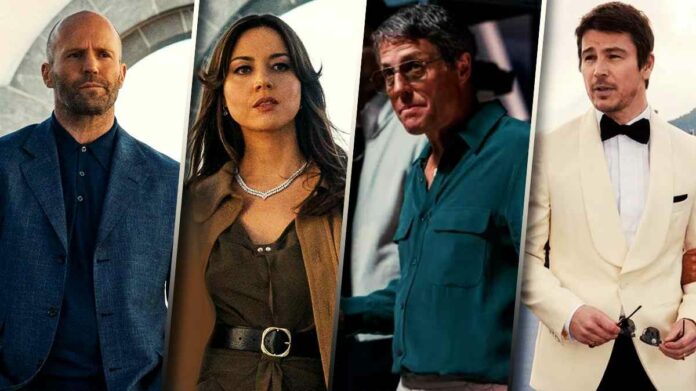For a spy film that has such a long string of interconnected events, “Operation Fortune: Ruse de Guerre” barely scratches the surface of its characters. What makes spy thrillers interesting, besides their plot, is when the characters are emotionally involved in some way or another. Similar films like “Red Notice,” “Knight and Day,” “Kingsman,” and “6 Underground” all have an emotional quotient, no matter how ridiculous the plot may be. This is the reason why “Operation Fortune: Ruse de Guerre” fails to have an impact. The absence of emotional weight in the plot makes the main characters seem like machines programmed to do tasks without making any errors. So, we are deprived of the thrill of uncertainty since, as the movie moves forward, it feels like the team can never go wrong. And that is exactly what happens. They never make a misstep or fail on a mission. They are only interrupted by their competition. Here’s more on the main characters of “Operation Fortune: Ruse de Guerre.”
Spoilers Ahead
Orson Fortune
A highly trained professional agent and an administrative nightmare, Orson is the eccentric and slightly more serious version of James Bond. However, he feels fake and devoid of personality. Throughout the film, he moves with a straight face, shows zero emotions, and follows his instructions to the tee. It is absolutely unreal just how dead he looks, whether it be taking on bad guys hand-to-hand, flying a helicopter, running after a man, or any other physical work. He also has this characteristic of requiring the best of everything while on the job, like the best wine, the best jet, and more. It is one thing to address him as an effective agent and a whole different thing to address him as a human. So when you come to realize that this guy just cannot go wrong no matter the “Ruse de Guerre” [strategy of war”], you get distanced from the character. This is because it is our flaws that make us human more than what we are good at. Orson Fortune thus surpasses his agenthood and, in that endeavor, loses his human qualities.
Sarah Fidel
A femme fatale with a sense of humor, Sarah Fidel is much more human than Orson can ever be. From the moment we see her on the screen to the end of the film, Sarah keeps our interest alive by dropping humor bombs across all missions. This, along with the suaveness with which she is able to switch from her spy personality to a lover of art, makes her a true spy, someone whom people will have trouble recognizing, not like Orson Fortune, whom anybody can doubt and even be annoyed by just by his manner of speaking (no offense to Jason Statham’s voice and accent here, although their mention might demand some).
Danny Francesco
Danny Francesco is an actor who loves what he does. But when he is thrown in the middle of a life-threatening mission—and that too by lying to his biggest fan, Greg Simmonds—he pulls off his best performance. He even takes a liking to Greg and is rather unhappy for having hurt Greg’s sentiments. Perhaps this regret is what made him join Greg in his last mission, in which they go and speak to Trent and Arnold (the biotech billionaire duo and the buyers of The Handle). Danny’s ultimate act of kindness and maybe even love for his fan Greg is when he plays Greg’s character in his upcoming film (mid-credits scene). This brings us to Greg Simmonds.
Greg Simmonds
Greg Simmonds is not only an important asset for Orson and his team but for us as well. That’s because he is the only character who is charismatic enough to attract our attention. When he talks, we listen (I need to give Hugh Grant credit for this). He may be an arms dealer, but the guy is surprisingly good-natured. Despite being backstabbed by his favorite actor, Danny Francesco, he decides to basically forgive him, addressing him as a “celebrity Trojan horse” used as bait by Orson and Sarah. He is someone who is considered scary due to the nature of the work he is involved in but comes across as a regular person who is rather humorous (other than his craving for women, which is yet another characteristic that has been a part of the traditional mold of characters belonging to the bad guy archetype). What he does for a living is his business, and it hasn’t been able to turn him into a quintessential antagonist who kills those who cross his path or try to come in his way. He was very angry when he found out that Sarah and Danny had compromised with him, but he didn’t order to have them killed but to have them brought back instead. This doesn’t happen, though, as Orson, Sarah, and Danny return on their own, and Greg joins the mission too. He is someone we would love to have as a friend, someone about whom we can brag to others as a world-class arms dealer. Wouldn’t we?
“Operation Fortune: Ruse de Guerre” focuses more on the mission than the spies and other characters. This is why we do not get a clear picture of them and have to rely on their behavior to figure out who they are. Hopefully, on their next mission, as mentioned by Nathan at the end of the film (a potential sequel to the film), we will be able to find out more about our agents and their pasts. Giving spies an emotional quotient is what brings them closer to us. His or her fighting skills are effective, but when he or she starts pulling punches, that’s when we start liking them because that’s what we expect of them. Spies are humans, too, a fact that Operation Fortune: Ruse de Guerre seems to have kept at bay.

